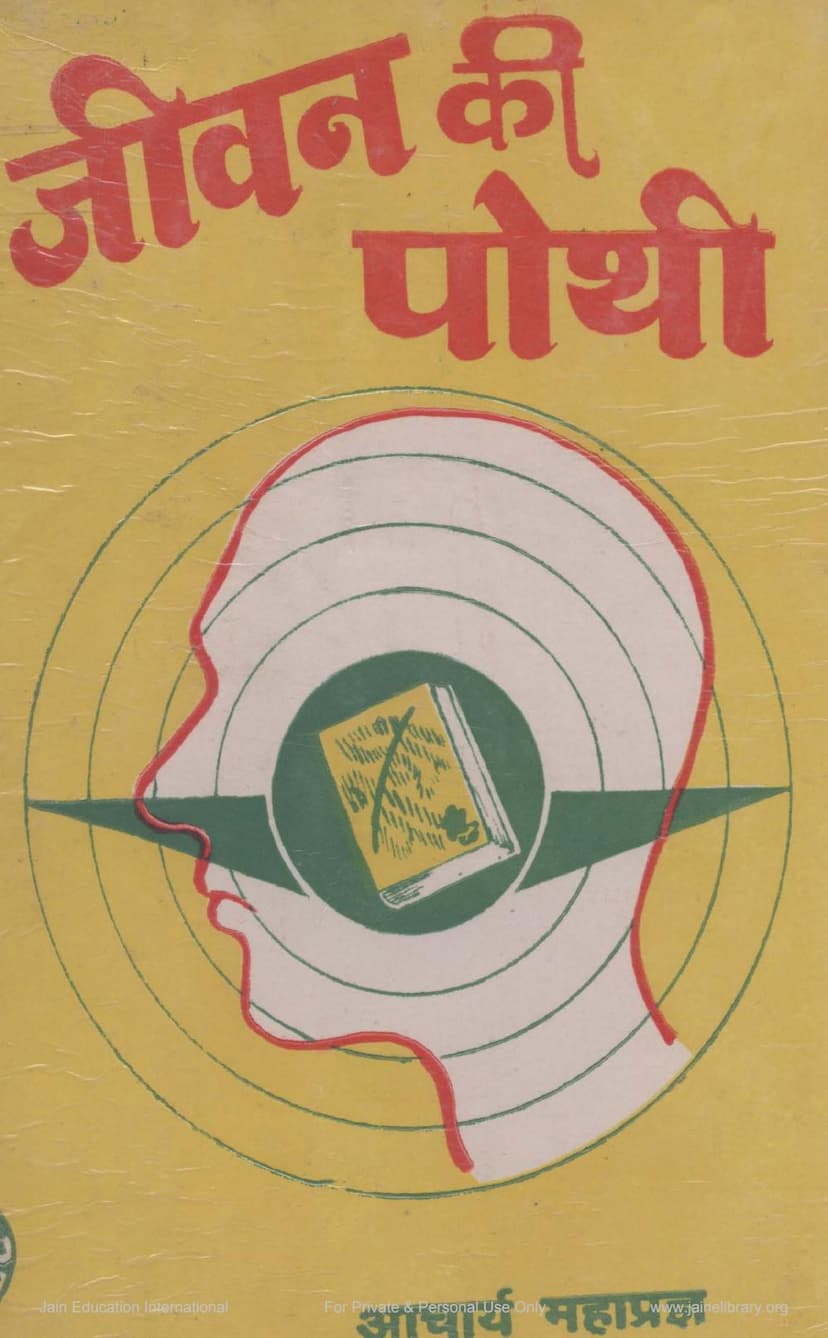Jivan Ki Pothi
Added to library: September 2, 2025

Summary
Here's a comprehensive summary of "Jivan ki Pothi" (The Book of Life) by Acharya Mahaprajna, based on the provided text:
"Jivan ki Pothi" (The Book of Life) by Acharya Mahaprajna, published by Jain Vishva Bharati, is a profound exploration of life, spirituality, and self-transformation, presented in a structured and insightful manner. The book is divided into several key sections, each delving into different facets of existence and spiritual practice.
Core Theme: The book emphasizes that life is a vast scripture, with its physical aspect being visible and its spiritual aspect being our divine essence. It highlights the interconnectedness of these two aspects and the importance of bridging the gap through friendship (maitri) and awareness (jagrukta).
Key Concepts and Sections:
-
Ishwar: Maitri (God: Friendship)
- What is God? God is defined as the ultimate ideal – infinite knowledge, infinite power, unhindered bliss, agelessness, and immortality. The goal is to strive towards this state by cultivating these qualities within ourselves.
- The Panch-Achar (Five Conducts): To achieve this ideal, the book outlines five essential practices: Gyan (Knowledge), Darshan (Perception/Insight), Charitra (Conduct/Character), Tap (Austerity/Self-Discipline), and Virya (Energy/Effort). Each of these is crucial for spiritual progress.
- The Role of Breath: Breath is presented as a vital tool to stabilize the mind, overcome its restlessness, and purify the consciousness, ultimately leading to inner peace and clarity.
- Chakra Centers: The book discusses five "centers" in the body corresponding to these five conducts: the crown (Gyan), between the eyebrows (Darshan), the heart area (Charitra), the navel (Tap), and the reproductive organs (Virya/Shakti). Activating and nurturing these centers is essential for holistic development.
- The Power of Consciousness: Ultimately, it's the purity and clarity of consciousness (Chitta ki Pavitrata) that leads to the attainment of one's ideal, making one "Ishwar-like."
-
Prashn Hai (The Question Arises)
- This section addresses fundamental questions about life, such as the nature of perspective, detachment, hedonism versus pragmatism, criticism, changing habits, building an integrated personality, and planning. It encourages introspection and critical thinking about these vital life aspects.
-
Jeevan ki Pothi (The Book of Life)
- This section delves into the journey of life, from childhood and the development of the mind and sexual energy to the evolution of power and spiritual understanding.
- Adhyatma ki Chaturspadi (The Fourfold Path of Spirituality): This path consists of:
- Anitya Anupreksha (Contemplation of Impermanence): Understanding that all material things are transient.
- Asharan Anupreksha (Contemplation of Helplessness/Lack of Refuge): Realizing that no external entity can ultimately provide refuge.
- Anyatva Anupreksha (Contemplation of Otherness): Differentiating the self from the body and external possessions.
- Ekatva Anupreksha (Contemplation of Oneness/Solitude): Realizing one's inherent solitary nature.
- Childhood: Childhood is described as a state of relative purity and simplicity, though it's acknowledged that children also carry innate tendencies and learn from their environment. The importance of observing and understanding childhood experiences is highlighted for personal growth.
-
Jagrukta (Awareness)
- The Essence of Awareness: Awareness is presented as the key to a fulfilling life, enabling one to face challenges with equanimity and creativity. It's about accepting reality, practicing mindful observation, maintaining balance, and facilitating positive change.
- Maîtri (Friendship): The book emphasizes the power of friendship, not just with others but also with life's challenges, including illness and old age. Cultivating a friendly attitude towards adversity can transform suffering into a source of growth and purification.
- The Power of Attitude: It stresses that one's attitude and mental state significantly influence the experience of pain and hardship. Developing courage, overcoming anxiety, and fostering a positive outlook are crucial for managing difficulties.
- Faith and Belief: True faith and belief stem from inner experience rather than blind adherence to dogma, making them resilient against doubt.
- The Role of Willpower (Sankalp): The book illustrates the transformative power of strong resolve, as seen in the story of Anathi, who overcame intense pain through sheer willpower and a vow.
- Inner Transformation: The ultimate goal is to access inner strength and transform negative emotions into positive ones, leading to a state of well-being and peace.
Overall Message:
"Jivan ki Pothi" is a practical guide to living a meaningful and spiritual life. It encourages readers to:
- Connect with their inner essence: By understanding the spiritual aspect of life and cultivating qualities like knowledge, perception, conduct, discipline, and effort.
- Embrace awareness: Through mindful observation, acceptance of reality, and continuous self-reflection.
- Practice friendship: Towards all aspects of life, including adversities, to foster peace and resilience.
- Cultivate inner strength: By understanding and managing emotions, developing willpower, and transforming negative tendencies.
- Seek inner joy: Realizing that true happiness and power lie within, independent of external circumstances or material possessions.
- Understand the self: Through introspection and the exploration of one's inner world, leading to a more integrated and fulfilling life.
The book advocates for a balanced approach, integrating spiritual principles with practical daily living, and emphasizes that true transformation comes from within.